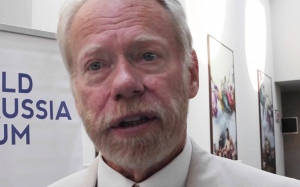News
“Protracted Conflict”: How the crisis in Ukraine became the new Cold War
Robert H. Legvold WF ’62 assesses the damage to date
 This story appeared in our Fall 2014 newsletter. To view the full newsletter online, click here.
This story appeared in our Fall 2014 newsletter. To view the full newsletter online, click here.
“No one should casually label the current confrontation between Russia and the West a ‘new Cold War,’” Robert Legvold WF ’62 wrote this summer in Foreign Affairs—but a new Cold War it is, he says, and one from which the two sides will not easily step back.
Dr. Legvold, Marshall D. Shulman Professor Emeritus of Political Science at Columbia University, directed the Euro-Atlantic Security Initiative from 2009 to 2012. He was also project director of “Rethinking U.S. Policy Toward Russia” at the American Academy of Arts and Sciences and is a former Senior Fellow and Director of the Soviet Studies Project at the Council on Foreign Relations in New York.
The crisis in Ukraine that has touched off this new Cold War, he explains, has roots in longstanding cultural and social divides—western portions of the country were at one time part of the Austro-Hungarian empire and Poland, while eastern areas have long been identified with Russia—but more recent history, including regional economic interests and political rivalries, have been equally important. Many eastern Ukrainians see their economy and industrial sector as dependent on Russia, while western Ukrainians believe their economic destiny is linked to Western Europe. “As a result,” Dr. Legvold wrote in an interview by email from Moscow, “the often unrecognized misfortune is that, while substantial majorities (70 percent) in both parts of the country—at least before the war in the east—say they want a unified Ukraine, neither, in end, wants it if it means conceding the other side’s position.”
Even so, these tensions might have been defused over the past 25 years had the West and Russia made it possible “for Ukraine not to choose sides, to practice a ‘risk-averting’ rather than ‘balancing’ strategy,” Dr. Legvold says. “For this to come about, the West and Russia together would have had to build the context for it and then both encourage and facilitate this choice on Ukraine’s part.” Instead, both sides pursued their own approaches. In such a divided region, “Outsiders, such as Russia, the EU, and the United States, become part of the problem rather part of the solution—or at a minimum neutral in their effect—if their involvement, even efforts to help, are narrowly focused or, worse, driven by narrow self-interest.”
Now compromise is unlikely. In the September 2014 issue of The National Interest, Dr. Legvold wrote, “Bluntly put, Ukraine seems fated to produce Europe’s latest and by far most portentous and dangerous ‘protracted conflict.’ Sadly, this may be the best outcome.” A proposal by Ukrainian president Petro Poroshenko to create a special status for parts of eastern Ukraine has fallen apart, and the two Ukrainian factions now have a “profoundly hardened view” of each other. While the West and Russia could yet choose to press for a settlement, Dr. Legvold says, the prospects are dim. “The evidence is that the Russian leadership views a ‘protracted conflict’ in eastern Ukraine as the best available alternative for pursuing its larger objectives in Ukraine.”
Meanwhile, Dr. Legvold observes, the West and Russia have regressed from regarding each other as “neither friend nor foe” to an adversarial relationship. Diplomatic and bureaucratic ties are being cut, and the conflict has potential to create larger international instabilities. Russia’s annexation of Crimea “represents a very serious violation of international norms—indeed, international law—that have been in place since… World War II.” He cites as an example the 1994 Budapest Memorandum, in which Ukraine gave up its nuclear weapons in exchange for security assurances from Russia, the United States, and the United Kingdom. Now, Dr. Legvold asks, “how compelling will guarantees to Iran or North Korea of their sovereignty as a condition of foregoing the nuclear option be?”
While the first Cold War’s stark bipolar ideological alliances are a thing of the past, Dr. Legvold recently told an audience at Brown University, the global effects of the new Cold War will be far-reaching. “[It] will not be universal, it won’t incorporate the entire international political system, it will be Russia and the West… [but] it is going to affect virtually every aspect of the international political system.”

